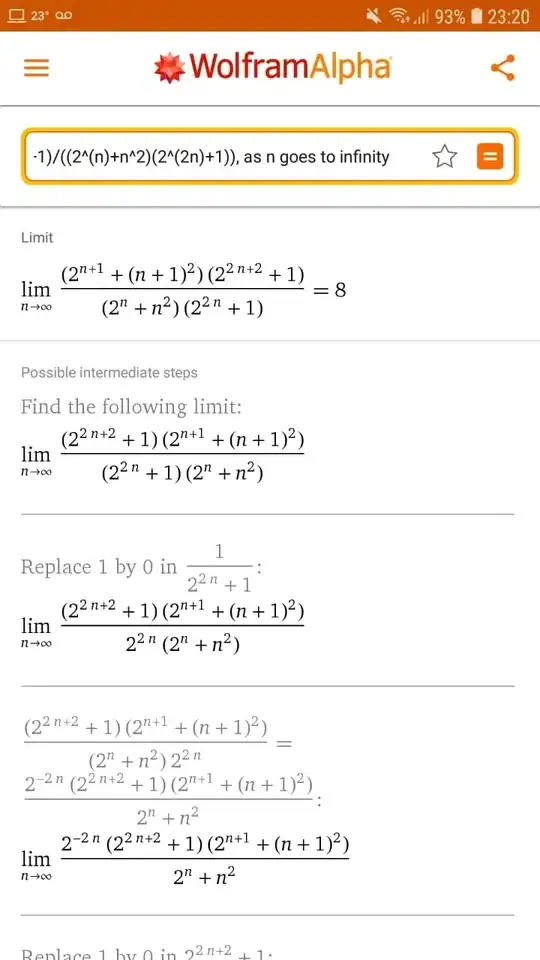I gotta evaluate the limit below:

My question is: can I simply replace $1$ by $0$ as it says? If so, why? If not, how could I evaluate it?
Well, this is specifically how you should not evaluate a limit step by step unless you are already an expert in art of calculus.
A lot more is going behind the scenes while performing these replacements which must be understood clearly otherwise the technique may lead you astray. Consider the following \begin{align} L&=\lim _{n\to \infty} \frac{(2^{n+1}+(n+1)^2)(2^{2n+2}+1)} {(2^{2n}+1)(2^{n}+n^2)} \tag{1}\\ &=\lim _{n\to \infty} \frac{(2^{n+1}+(n+1)^2)(2^{2n+2}+1)} {2^{2n}(1+2^{-2n})(2^{n}+n^2)}\\ &=\lim _{n\to \infty} \frac{(2^{n+1}+(n+1)^2)(2^{2n+2}+1)} {2^{2n}\cdot 1\cdot(2^{n}+n^2)}\\ &=\lim _{n\to \infty} \frac{(2^{n+1}+(n+1)^2)(2^{2n+2}+1)} {2^{2n}(2^{n}+n^2)}\tag{2} \end{align} If you look at equations $(1)$ and $(2)$ you will see that the $1$ in $(2^{2n}+1)$ has been replaced by $0$ but in reality we have replaced the sub-expression $(1+2^{-2n})$ with its limit $1$ and this is based on the standard limit $\lim_{n\to\infty} n^ab^{-n} =0$ if $b>1$.
While evaluating limit of a complicated expression it is possible to replace a sub-expression with its limit in a step under certain circumstances but one can not replace a sub-expression $A$ by another sub-expression $B$ unless $A=B$.
If you do replace expressions $A$ with $B$ and $A\neq B$ and it works fine then it means you have omitted certain steps. If you know those steps then it is fine otherwise it will be become a mystery when such replacements don't lead to a correct answer.
You can replace that $1$ by a $0$ because as $n\rightarrow \infty$ the constant term $1$ in $(2^{2n}+1)$ is insignificant because $2^{2n}$ grows rapidly.
$$\lim_{n \to \infty} \frac{g(n)}{2^{2n}+1}= \lim_{n \to \infty} \frac{g(n)}{2^{2n}\cdot \frac{2^{2n}+1}{2^{2n}}}= \lim_{n \to \infty} \frac{g(n)}{2^{2n}}\lim_{n \to \infty}\frac{2^{2n}}{2^{2n}+1}=\lim_{n \to \infty} \frac{g(n)}{2^{2n}}$$
since $\lim_{n \to \infty} \frac{2^{2n}}{2^{2n}+1}=1$.
In fact, we know that
$$\lim_{n \to \infty} \frac{(2^{n+1}+(n+1)^2)(2^{2n+2}+1)}{(2^n+n^2)(2^{2n}+1)}=\lim_{n \to \infty}\frac{2^{n+1}\cdot 2^{2n+2}}{2^n\cdot 2^{2n}}=2^3=8$$
Since $1$ is constant, it is insignificant compared to $2^{2n}$ as $n\rightarrow\infty$ so we may remove it from the term $\dfrac{1}{2^{2n}+1}$